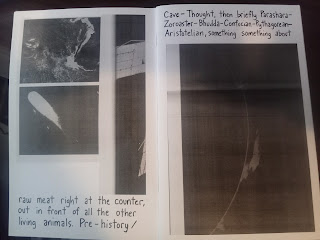Let's jump back into the world of Aaron Cockle and Andalusian Dog. Cockle's been hard at work pumping out issues of his enigmatic pastiche of and ode to the work of sci-fi author Philip K. Dick, producing six issues in the last couple of years and a related zine, Solar Lottery. The essence of these heavily text-driven zines with sparse and frequently oblique illustrations has revolved around the concept of a VR game called Andalusian Dog. It essentially transforms your own reality into a Grand Theft Auto overlay, with various instructions and missions to perform in real life.
Cockle took this idea and meshed it with the concepts behind several Dick novels (including VALIS, The Three Stigmata Of Palmer Eldritch, Clans Of The Alphane Moon, The Penultimate Truth, Ubik, and others) and fuses it with modern technology to spin an oblique narrative and metanarrative. It revolves around alien intelligences, sex cults, drugs, office drudgery, and the total destabilization of society. Frequently quoting from Dick directly, Cockle focuses on the fear, paranoia, and inherently destructive and isolating qualities of late capitalism and how technology can be used as another tool of dehumanization that is an essential element of this nihilistic death cult.
Like Dick, Cockle sees the future, and it is grim. From self-replicating androids designed to replace humans to horrifying drugs that permanently alter one's sense of reality, there's no escape once you've been caught up in this conspiratorial web. At the same time, there's a sense that it's the only game in town. It's the only way to remain relevant. We are willing consumers of our own annihilation. Cockle implies that there is resistance here and there, but even this resistance has its own agenda. The individual has no chance because they have been reduced to mere individuality. Once again, much of this work stretches the very definition of comics or sequential art; it's closer to comics-as-poetry than anything else in terms of how there is something important about the illustrations and collages he uses with regard to how they interact with the text, but that relationship isn't necessarily easy to understand or parse. It's as though Cockle is working on a deeply subconscious level, hoping to trigger connections and even memories (ala VALIS) in an effort to wake us up.






No comments:
Post a Comment